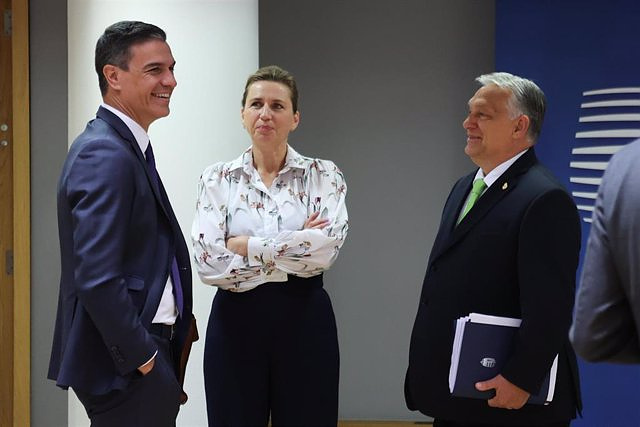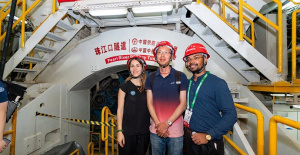BRUSSELS, June 30 (EUROPA PRESS) -
The heads of State and Government of the European Union have resisted this Friday the pulse of their Hungarian colleagues, Viktor Orbán, and Polish, Mateusz Morawiecki, to try to impose unanimity in common decisions on migration policy and thus reverse the recent agreement reached at the level of ministers to create a mandatory mechanism for the distribution of the burden of asylum among the Twenty-seven.
The summit of leaders in Brussels has concluded with a text of conclusions that leaves out the ideas contained in the draft on migration due to the blockade of Budapest and Warsaw, which has forced the president of the European Council, Charles Michel, to publish those ideas in a parallel own statement supported by all the other leaders.
"We have taken a new important step that validates the agreement reached by a qualified majority", Michel highlighted at the end of the European Council, in a press conference in which he confirmed that Hungary and Poland "disapprove" both the "substance" of the pact that the EU negotiates as with the "decision process".
Along the same lines, the Swedish Prime Minister, Ulf Kristersson, has stressed that an "overwhelming majority" --represented by 25 of the 27 leaders-- has given its support to Michel's statement, which in practice means an endorsement greater than that reached at the level of ministers weeks ago where, in addition to the opposition of Hungary and Poland, other countries showed reservations that this Friday they have not maintained.
"It is a very solid basis for the continuation of the work," insisted Kristersson, who, like other leaders who have spoken between Thursday and Friday on the matter, have stressed that migration and asylum decisions within the EU is taken by a qualified majority and not unanimously, because that is what the Treaties stipulate.
Asked about the tensions, Michel wanted to value the fact that the leaders have "shown cold blood and calm" because it will allow them to "continue advancing" in the negotiations to meet the objective of closing the Migration Pact before the end of this legislature in June next year.
After a first frustrated attempt by the Twenty-seven to agree on a text of conclusions on Thursday, the Italian president, Giorgia Meloni, also unsuccessfully tried to convince Orbán and Morawiecki early on Friday in a private trilateral meeting to raise their reserves.
Meloni later told the press that she is not "disappointed" because she understands that Hungary and Poland are simply defending national interests, although she has warned that "there will never be unanimity" on migration in the EU and has defended the need to overcome differences betting on strengthening the external dimension of migration and asylum management.
"But it is not a disaster that the conclusions have not been adopted, everything on which there has been progress will continue," reasoned the Prime Minister of the Netherlands, Mark Rutte, who also evoked the commitment to strengthen support for Tunisia to curb illegal routes as a model that should be "replicated" with other third countries.
The President of the Government, Pedro Sánchez, for his part, has lamented the "blindness" that, in his opinion, is shown by the EU countries that do not recognize the importance of the external dimension; At the same time, he has hoped that, during the semester of the EU presidency that Spain assumes from this Saturday, the 27 will reach an agreement on immigration reform that "balances responsibility and solidarity."

 Exploring Cardano: Inner Workings and Advantages of this Cryptocurrency
Exploring Cardano: Inner Workings and Advantages of this Cryptocurrency Seville.- Economy.- Innova.- STSA inaugurates its new painting and sealing hangar in San Pablo, for 18 million
Seville.- Economy.- Innova.- STSA inaugurates its new painting and sealing hangar in San Pablo, for 18 million Innova.- More than 300 volunteers join the Andalucía Compromiso Digital network in one month to facilitate access to ICT
Innova.- More than 300 volunteers join the Andalucía Compromiso Digital network in one month to facilitate access to ICT Innova.-AMP.- Ayesa acquires 51% of Sadiel, which will create new technological engineering products and expand markets
Innova.-AMP.- Ayesa acquires 51% of Sadiel, which will create new technological engineering products and expand markets Unicaja lifts its first FIBA Champions League at the expense of Lenovo Tenerife
Unicaja lifts its first FIBA Champions League at the expense of Lenovo Tenerife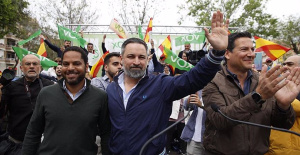 Abascal (Vox) criticizes that Sánchez is "victimizing" himself and calls for elections after his possible resignation
Abascal (Vox) criticizes that Sánchez is "victimizing" himself and calls for elections after his possible resignation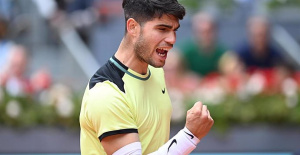 Carlos Alcaraz reaches the round of 16 in Madrid without breaking a sweat
Carlos Alcaraz reaches the round of 16 in Madrid without breaking a sweat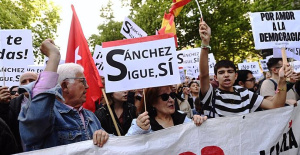 Some 5,000 people demonstrate in front of Congress for democracy, hours before Sánchez's decision
Some 5,000 people demonstrate in front of Congress for democracy, hours before Sánchez's decision How Blockchain in being used to shape the future
How Blockchain in being used to shape the future Not just BTC and ETH: Here Are Some More Interesting Coins Worth Focusing on
Not just BTC and ETH: Here Are Some More Interesting Coins Worth Focusing on UPV students build a prototype of a wooden house to move to Equatorial Guinea
UPV students build a prototype of a wooden house to move to Equatorial Guinea The UA opens the call for the Impulso 2024 Awards for the best innovative business initiatives
The UA opens the call for the Impulso 2024 Awards for the best innovative business initiatives ALI, virtual assistant from Alicante, internationally recognized by the OECD
ALI, virtual assistant from Alicante, internationally recognized by the OECD Retrópolis brings the golden age of video games and computing to the UPV
Retrópolis brings the golden age of video games and computing to the UPV A million people demonstrate in France against Macron's pension reform
A million people demonstrate in France against Macron's pension reform Russia launches several missiles against "critical infrastructure" in the city of Zaporizhia
Russia launches several missiles against "critical infrastructure" in the city of Zaporizhia A "procession" remembers the dead of the Calabria shipwreck as bodies continue to wash up on the shore
A "procession" remembers the dead of the Calabria shipwreck as bodies continue to wash up on the shore Prison sentences handed down for three prominent Hong Kong pro-democracy activists
Prison sentences handed down for three prominent Hong Kong pro-democracy activists ETH continues to leave trading platforms, Ethereum balance on exchanges lowest in 3 years
ETH continues to leave trading platforms, Ethereum balance on exchanges lowest in 3 years Investors invest $450 million in Consensys, Ethereum incubator now valued at $7 billion
Investors invest $450 million in Consensys, Ethereum incubator now valued at $7 billion Alchemy Integrates Ethereum L2 Product Starknet to Enhance Web3 Scalability at a Price 100x Lower Than L1 Fees
Alchemy Integrates Ethereum L2 Product Starknet to Enhance Web3 Scalability at a Price 100x Lower Than L1 Fees Mining Report: Bitcoin's Electricity Consumption Declines by 25% in Q1 2022
Mining Report: Bitcoin's Electricity Consumption Declines by 25% in Q1 2022 Oil-to-Bitcoin Mining Firm Crusoe Energy Systems Raised $505 Million
Oil-to-Bitcoin Mining Firm Crusoe Energy Systems Raised $505 Million Microbt reveals the latest Bitcoin mining rigs -- Machines produce up to 126 TH/s with custom 5nm chip design
Microbt reveals the latest Bitcoin mining rigs -- Machines produce up to 126 TH/s with custom 5nm chip design Bitcoin's Mining Difficulty Hits a Lifetime High, With More Than 90% of BTC Supply Issued
Bitcoin's Mining Difficulty Hits a Lifetime High, With More Than 90% of BTC Supply Issued The Biggest Movers are Near, EOS, and RUNE during Friday's Selloff
The Biggest Movers are Near, EOS, and RUNE during Friday's Selloff Global Markets Spooked by a Hawkish Fed and Covid, Stocks and Crypto Gain After Musk Buys Twitter
Global Markets Spooked by a Hawkish Fed and Covid, Stocks and Crypto Gain After Musk Buys Twitter Bitso to offset carbon emissions from the Trading Platform's ERC20, ETH, and BTC Transactions
Bitso to offset carbon emissions from the Trading Platform's ERC20, ETH, and BTC Transactions Draftkings Announces 2022 College Hoops NFT Selection for March Madness
Draftkings Announces 2022 College Hoops NFT Selection for March Madness